- HOME
- ABOUT ME
- movies
- MEDIA
- L.Onerva
- Eino Leino
- Eeva-Liisa Manner
- Erään Opon päiväkirja
- Elämänkenttäni
- Elämäni ”viiva”
- Käyttöteoriani – se miten minä ohjaan
- Kulttuuritietoinen ja kansainvälistyvä ohjaus
- Ohjauksen järjestäminen maahanmuuttajakoulutuksessa
- Ohjauksen yhteiskunnallinen viitekehys
- Ohjaukäsite
- Oma opiskeluorientaatio
- Opiskelijoiden yksilöllisyys ohjauksessa
- EETTISET KYSYMYKSET
- Psykososiaalisen kehityksen teoria
- Suhteeni erilaisuuteen ja tehtäväni opinto-ohjaajana
- Opinto-ohjauksen ja erityisopetuksen yhtäläisyyksiä ja eroja
- Kehitykseni opinto-ohjaajana
- Maahanmuuttajan uraohjaus
- Maahanmuuttajien ohjaus ja neuvonta: kuka, mitä, miten?
- Ohjauksen tulevaisuus
- Elämänkenttäni
- Mariana Marin
- Claudiu Komartin
- Mariana Codrut
- Roland Erb
- Romanian poetry
- ESSAYS
- STORIES
- CLASSIC POETRY
- CONTEMPORARY POETRY
- TRANSLATED POEMS
- READING POETRY
- CONTACT
- translated Italian-English
- translated Italian-Romanian
- translated Spanish-English
- translated Spanish-Romanian
July, 2023
O caldă înțelegere umană / A warm human understanding
POSTED IN Mariana July 28, 2023
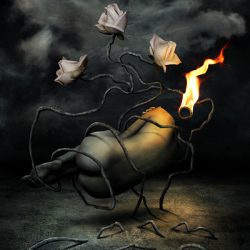
O caldă înțelegere umană / A warm human understanding
Totul este atât de departe,
încât sentimentele și-ar declara singure
legea marțială.
Aici nimeni nu te poate salva.
Dimineața stau de vorbă cu bătrânul Kolea,
– basarabeanul de o sută de ani din inima câmpiei.
Prin fumul gros lăsat de pipele noastre
cuvintele au mai găsit câte o amintire
înfiptă în coapsa vocabularului.
Vorbim despre mugurii calzi și grădinărit,
despre exilul morții de la un anotimp la altul,
despre războiul care amușină în jurul castelului de apă,
despre sensibilitatea ultragiată și despre limba română.
Bătrânul Kolea nu mai are nimic de pierdut.
Eu pierd zilnic totul.
Poate de aceea ne înțelegem atât de bine
când acceleratul de 8 este inundat de o caldă înțelegere umană
și trece el sfios, acceleratul,
prin carnea de o sută de ani,
prin stupii harnici care pot șterge la cer
urmele oricărei crime,
prin hohotul care de-abia mă mai rabdă.
– Sigur că vine o vreme
când trebuie să-ți recapeți demnitatea,
– murmură pedagogic bătrânul Kolea, basarabeanul.
A devenit vinovată trecerea sub tăcere
a numărului de morți de la Dachau și Auschwitz?
A deveniiit…
Să fremătăm atunci de bucurie
tu, spirit,
și tu, hoit!
Poate se va vorbi într-o zi
și despre adevărul acesta
aidoma unei condicuțe ieșită noaptea
să ațâțe gunoiul cât muntele de mare,
cât neputința și bestialitatea ei.Mariana MARIN
……………..
A warm human understanding
Everything is so far away
that the feelings would declare their own
martial law.
No one can save you here.
In the morning I talk with the old man Kolea,
– the hundred-year-old Bessarabian from the heart of the plain.
Through the thick smoke left by our pipes
the words found one more memory
embedded in the thigh of the vocabulary.
We talk about warm buds and gardening,
about the exile of death from one season to another,
about the war sniffing around the water castle,
about the offended sensibility and about the Romanian language.
Old Kolea has nothing left to lose.
I lose everything daily.
Maybe that’s why we get along so well
when the 8 o’clock fast train is flooded with a warm human understanding
and it passes timidly, the fast train,
through the one hundred years flesh,
through the industrious beehives that can erase on the sky
the traces of any crime,
through the roar that can hardly stand me anymore.
– Of course there comes a time
when you have to regain your dignity,
– old Kolea the Bessarabian murmurs pedagogically.
Has become culpable the keeping under wraps of the death toll at Dachau and Auschwitz
It becaaame…
Let us tremble with joy then,
you, spirit,
and you, corpse!
Maybe it will be spoken one day
about this truth also,
like a prostitue who goes out at night
to stir up the garbage as big as the mountain,
as her helplessness and bestiality.trad. M. M. Biela
Leprozeria / The leper colony
POSTED IN Mariana July 28, 2023
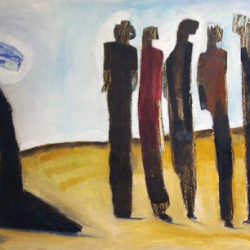
Leprozeria / The leper colonyAveai dreptate, Sebastian Reichmann!
Ne trăiam scalpul cu aceeași ferocitate
pe care am putea-o bănui în burțile copiilor africani.
Ne despărțim mereu de ceva.
O țesătură ușoară de obsesii,
un vânticel de răsărit cu spahii,
o piatră țâșnind din senin
în trenul care te poartă, te poartă
…și pare de-ajuns:
Bolile sociale, aidoma bolilor de piele,
proliferează subtil.
La 1956 nu s-ar putea spune
că Europa nu avea pentru mine
un oarecare mister.
Lupta dintre contrarii
gâfâia pe aproape așteptându-mă,
așteptându-te, vrându-ne vii…
Dar ce poate fi mai frumos
decât o copilărie tăiată mărunt
care să îmblânzească în timp hrăpăreața memorie!Ce bine e să stai mai târziu
cu un ghemotoc de hârtie lipit de cerul gurii:
„Du-te! Du-te!
Palidă și foarte tristă
ești prea goală
pentru veacul eunuc!”
Oricum, de la crima de atunci
la cinismul ei de acum
cărțile morților
au licitat viețile sfinților
și ai învățat să pierzi.
Mariana MARIN…………………
The leper colony
You were right, Sebastian Reichmann!
We were experiencing our scalps with the same ferocity
that we might suspect in the bellies of African children.
We always part with something.
A light fabric of obsessions,
an easterly breeze with spahis,
a stone springing out of nowhere
in the train that carries you, carries you
…and it seems enough:
Social diseases, like the skin diseases,
subtly proliferate.
In 1956 it could not be said
that Europe didn’t have some mystery
for me.
The fight between opposites
was panting nearby waiting for me,
waiting for you, wanting us alive…
But what could be more beautiful
than a childhood chopped up
to tame in time the rapacious memory!How good it is to sit later
with a paper ball stuck to the roof of the mouth:
“Go! Go!
Pale and very sad
you are too empty
for the eunuch age!”
Anyway, since the crime of then
to her cynicism of now
the books of the dead
auctioned the lives of the saints
and you have learned to lose.
trad. M. M. Biela
cerul-diamant / the diamond-sky
POSTED IN Mariana Codrut July 28, 2023
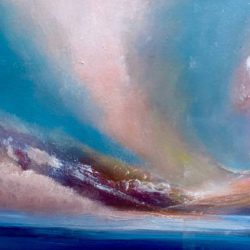
cerul-diamant / the diamond-skyînăuntru vedeai
prin piele, prin pléoape
– un cer cald, lichid
te ținea aproape.nu știai de nu
cînd te-au smuls. au zis:
”și-n cerul de afară
să te scalzi ți-e scris!”.dar, orbitor și rece,
el taie-n carne vie.
o bucată lui,
o bucată ție,
o bucată lui,
o bucată ție…Mariana CODRUT
…………..
the diamond-sky
inside you could see
through skin, eyelids through
– a warm, liquid sky
that close held you.of no you did not know
when snatched you’ve been.’twas said:
“in the sky outside
to bathe is your fate!”but, blinding and cold,
living flesh he cuts through
one piece for him
one piece for you
one piece for him
one piece for you…trad. M. M. Biela
Sufletele mele-s doua / My souls are two
POSTED IN classic poetry, Romanian July 26, 2023
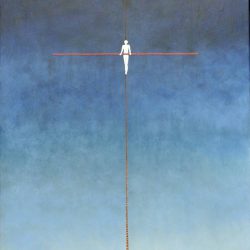
Sufletele mele-s doua / My souls are two
Sufletul mi-e un jucator pe sfoara.
Dar sufletele mele-s doua.
Unul intinde sfoara si o desfasoara
Necontenit, taioasa, vie, noua,
Si celuilalt «ridica-te si du-te»-i spune,
Si celalalt, rinjind i se supune.
Ochii acestuia de fiara sint
Si-l gauresc uitindu-se-n pamint
Si seaca apa si-ard pe sus
Soimii de vii, in zborul din apus.Monstrul din aer poate sa se lase
Purtat in bici pe firul de matase,
Cu talpa lui de piatra si pamint,
Parca purtat si leganat de vint.
Scrisneste.
S-a oprit.
Nu-i dau ragaz.
Biciul meu greu ii cade pe grumaz,
Pe umere, pe pulpe, pe picioare.
Racneste, urla, vrea sa se scoboare.Nu-i nici-o clipa de repaos.
Arunca-te si cazi in haos,
Si ametit, precipitat in el,
Sfarima-ncuietoarea de otel.
Tudor ARGHEZI
……………….
My souls are two
My soul is tightrope walker thru.
But my souls are two.
One stretches out the rope and unwinds it
Unceasingly, sharp, alive, new,
And tells the other “get up and go”,
And the other, grinning, does so.
His eyes are beast-like bound
While watching they are piercing the ground .
And they dry the water and burn in sight
The falcons alive, in their sunset flight.The monster in the air itself could let
Be whipped along the silken thread,
With its sole of stone and clay
As if by wind carried and swayed.
Grinds.
Stops.
I don’t give him a break.
My whip falls heavily on his neck,
his shoulders, his thighs, on his feet.
He roars, he shouts, he wants to descendThere is not a moment of rest or pause
Throw yourself and fall into the chaos,
And dizzy, plunged into havoc,
Shatter and break the steel lock.trad. M. M. Biela
Opowiadanie o starych kobietach / A story of old women / O poveste despre batrane
POSTED IN classic poetry July 25, 2023
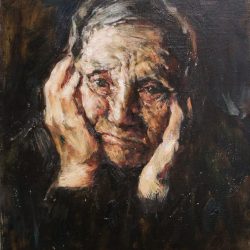
Opowiadanie o starych kobietach / A story of old women / O poveste despre batrane
Lubię stare kobiety
brzydkie kobiety
złe kobietysą solą ziemi
nie brzydzą się
ludzkimi odpadkami
znają odwrotną stronę
medalu
miłości
wiaryprzychodzą i odchodzą
dyktatorzy błaznują
mają ręce splamione
krwią ludzkich istotstare kobiety wstają o świcie
kupują mięso owoce chleb
sprzątają gotują
stoją na ulicy z założonymi
rękamimilczą
stare kobiety
są nieśmiertelneHamlet miota się w sieci
Faust gra rolę nikczemną i śmieszną
Raskolnikow uderza siekierą
stare kobiety są
niezniszczalne
uśmiechają się pobłażliwieumiera bóg
stare kobiety wstają jak co dzień
o świcie kupują chleb wino rybęumiera cywilizacja
stare kobiety wstają o świcie
otwierają okna
usuwają nieczystościumiera człowiek
stare kobiety
myją zwłoki
grzebią umarłych
sadzą kwiaty
na grobachlubię stare kobiety
brzydkie kobiety
złe kobietywierzą w życie wieczne
są solą ziemi
korą drzewa
są pokornymi oczami zwierząttchórzostwo i bohaterstwo
wielkość i małość
widzą w wymiarach właściwychzbliżonych do wymagań
dnia powszedniegoich synowie odkrywają Amerykę
giną pod Termopilami
umierają na krzyżach
zdobywają kosmosstare kobiety wychodzą o świcie
do miasta kupują mleko chleb
mięso przyprawiają zupę
otwierają oknatylko głupcy śmieją się
ze starych kobiet
brzydkich kobiet
złych kobietbo to są piękne kobiety
dobre kobietystare kobiety
są jajem
są tajemnicą bez tajemnicy
są kulą która się toczystare kobiety
są mumiami
świętych kotówsą małymi
wysychającymi źródłami
pomarszczonymi owocami
albo tłustymi
owalnymi buddamikiedy umierają
z oka wypływa
łza
i łączy się
na ustach z uśmiechem
młodej dziewczyny
Tadeusz Różewicz
……………………
A STORY OF OLD WOMEN
I like old women
ugly women
mean womenthey are the salt of the earth
they don’t abhor
human wastethey know the flipside
of the coin
of love
of faithcoming and going
dictators fool around
their hands are stained
with human bloodold women get up at dawn
they buy meat fruit bread
clean cook
stand on the street
arms foldedsilently
old women
are immortalHamlet is thrashing around in the net
Faust plays a wicked and ridiculous role
Raskolnikov strikes with an axeold women are
indestructible
they smile indulgentlygod dies
old women get up like every day
at dawn they buy bread wine fishcivilization dies
old women get up at dawn
open the windows
remove the filtha man dies
old women
wash the corpse
bury the dead
plant flowers
on the gravesi like old women
ugly women
mean womenthey believe in eternal life
they are the salt of the earth
Tree bark
the humble eyes of animalscowardice and heroism
greatness and pettiness
they see the right perspectiveclose to the demands
of everyday lifetheir sons discover America
perish at Thermopylae
they die on the cross
conquer the spaceold women go out to the city at dawn
to buy milk bread meat
to season the soup
they open the windowsonly fools laugh
at old women
ugly women
mean womenfor they are beautiful
good womenold women
they are an embryo
a mystery devoid of mystery
a rolling sphereold women
are the mummies
of sacred catsthey are either small
drying springs
wrinkled fruit
or plump
oval buddhaswhen they die a tear
flows from the eye
and joins
on the lips
with the smile
of a young girl.
………………..
O poveste despre bătrâne
Îmi plac bătrânele
femei urâte
releele sunt sarea pământului
ele nu detesta
deșeul uman
ele cunosc reversul
medaliei
al dragostei
al credinţeivin și pleacă
dictatorii care fac pe clovnii
cu mâinile pătate
de sângele-omenescbătrânele se trezesc în zori
cumpără pâine fructe carne
fac curatenie gatesc
stau în stradă cu bratele incrucisatetacute
femeile bătrâne
sunt nemuritoareHamlet se zbate în plasă
Faust joacă un rol răutacios și ridicol
Raskolnikov lovește cu un topor
femeile bătrâne sunt
indestructibile
ele zâmbesc îngăduitoareDumnezeu moare
bătrânele se trezesc ca în fiecare zi
în zori cumpără pâine vin peștecivilizația moare
bătrânele se trezesc în zori
deschid ferestrele
îndepărtează murdariamoare un om
bătrânele
spală cadavrul
îngroapă mortul
plantează flori
pe morminteimi plac femeile batrane
femei urâte
femei releele cred în viața veșnică
sunt sarea pământului
scoarta copacului
sunt ochii umili ai animalelorlașitate și eroism
măreție și micime
ele văd prin prisma potrivitasimilara cerintelor
vietii de zi cu zifiii lor descoperă America
se pierd la Termopile
mor crucificati
cuceresc universulbătrânele pleaca în oras de cu zori
cumpără lapte pâine carne
condimenteaza supa
deschid ferestrelenumai prostii rad
de femeile bătrâne
femei urâte
femei relepentru că sunt femei frumoase
femei bunefemei bătrâne
sunt un embrion
sunt un mister fara de mister
sunt o minge care se da de-a durafemeile bătrâne
sunt mumiile
pisicilor sfintesunt fie mici
izvoare uscate
fructe încrețite
sau buddha gras
si ovalcând mor, o lacrima
curge din ochi
și se uneste
pe buze cu zâmbetul
unei fete tinere.
trad. M. M. Biela
Săptămâna Patimilor / The Holy Week
POSTED IN Mariana July 19, 2023
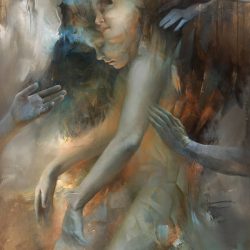
Săptămâna Patimilor / The Holy Week
Duioasă fericire și liniște a cărnii
într-o dimineaţă de odihnă;
și, deodată, amintirea rapiţei
și a elevului K.: „Dacă au semănat porumb
de ce a ieșit atâta rapiţă?”
O Săptămână a patimilor luminată
de o Noapte a Sfântului Bartolomeu
și un fel de păpușă mecanică, rasă în cap,
un fel de gură de câine: „Veniţi de la Poarta Albă?”
Astfel poate începe senzaţia aceea de gol
care anunţă venirea ficţiunii.
Ea trece la numai trei pași de casa ta
și tu îi adulmeci prin aer securea mătăsoasă,
vibraţia semnelor, carnea care i se desprinde încet.
Elevul K. și gura de câine își pot schimba rolurile
și toate sub ochii tăi,
acoperiţi de grămezi nesfârșite de rapiţă…Tu însăţi schimbi dubioasa zi de odihnă legală
cu ecoul livresc al Nopţii Sfântului Bartolomeu;tu însăţi treci mai târziu
la numai trei pași de casa ta,
adulmecând prin aer o băltoacă mătăsoasă,
prin viaţa ta, gură de câine,
păpușă mecanică,
rasă în cap.
Mariana MARIN
…………………..The Holy Week
Sweet bliss and peace of flesh
on a restful morning;
and, suddenly, the memory of rapeseed
and of student K.: “If they sowed corn
why did so much rapeseed come out?”
A Holy Week illuminated
by a Night of St Bartholomew
and a kind of mechanical doll, shaved head,
a kind of dog’s mouth: “Have you come from the White Gate?”
Thus can begin that feeling of emptiness
that heralds the arrival of fiction.
It passes only three steps from your house
and you sniff its silky ax through the air,
the vibration of the signs, its slowly peeling of flesh.
Student K. and the dog’s mouth can switch roles
and all before your eyes,
covered with endless piles of rapeseed…You yourself exchange the dubious legal day of rest
with the bookish echo of St Bartholomew’s Night;thou thyself pass’st later
only three steps from thy home,
sniffing through the air a silky puddle,
through thy life, dog-mouthed,
mechanical doll,
shaved head
trad. M. M. Biela
Pumaho
POSTED IN Mariana July 15, 2023
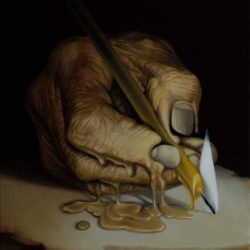
Pumaho
Refuz să mai privesc realitatea în față.
Port în brațe doar poemul acesta
care miroase urât – câine mort.
Îl pocnesc și bucăți de carne
sar din râsul hidos.
Plec atunci la marginea mării să mă spăl.
El îmi sare în față
și mă trezesc în hainele de luni
funcționar tăcut,
spoind lumea cu literele unui alfabet
singuratic și mort.
– Trebuie notat totul, îmi șoptește
manșeta mea roasă de viață.
Inventează acolo unde ochii îți cad înaintea plânsului
și limba se desfată înainte de râs.
Îmi iau atunci sfertul de secol în spate
și, iată, notez:
„La întretăierea drumurilor comerciale
se poate muri prin utopie sau uitare de sine.
O lume brutală, ai spune,
dacă anumite previziuni nu te-ar mai fi dus cu vorba
din epoca ming și te-ar fi părăsit în epoca tao.
La intrarea în muncile de primăvară
mâinile umflate ale copiilor sugrumă ardeiul gras
cu dexteritatea unui mecanism social
și pe cer e numai fum.
Apoi devine o obișnuință.
Mirosul prostiei?
Imaginați-vă
(aici naratorul e alb și tremură
în fața memoriei sale clevetitoare)
carnea a o sută de oi
sub roțile a 21 de vagoane de tren.
Ehei, cum ți-ai mai salva atunci pielea
într-o tăbăcărie umedă,
hohotind sub iarba înaltă!La întretăierea drumurilor comerciale
memoria scapă esențialul, ca într-un fel
de uriașă măcelărie unde mirosurile
se destind și pe cer e numai fum.Trebuie notat totul, spunea
manșeta mea roasă de viață.
La întretăierea acestei lumi
cu imaginea sa despre sine
am privit realitatea în față.
Am fost la marginea mării să mă spăl.
Ochii mi s-au înnegrit înaintea plânsului.Limba mi s-a înverzit înaintea ierbii.
Sfertul de secol a simțit mirosul prostiei
și într-un târziu dexteritatea unui mecanism social
mi-a căzut la picioare și mi-a șoptit:
– Trebuie notat totul
chiar dacă mă pocnești
în această uriașă măcelărie
unde mai crezi că te poți salva,
printre hălci de ardei gras,
unde ai visat și ai scris
ca o manșetă roasă de viață,
unde ai chicotit cu fusta-nstelată
când mirosurile se destind și pe cer e numai fum…Mariana MARIN
…………………..
Pumaho
(10 a.m. and 3 p.m. at obor station)
I refuse to face reality anymore.
I hold only this poem
that stinks – dead dog.
I slap him and chunks of flesh
jump from the hideous laughter.
I then go to the edge of the sea to wash myself.
He jumps in front of me
and I wake up in Monday’s clothes
silent clerk,
whitewashing the world with the letters of a lonely and dead
alphabet.
– Everything must be written down, whispers to me
my worn by life sleeve.
Invent where your eyes fall before weeping
and the tongue relishes before laughter.
I then take my quarter of a century on my back
and, here, I note:
“At the intersection of trade routes
one can die through utopia or self-forgetfulness.
A brutal world, you’d say
if certain predictions hadn’t talked you around
from the ming era and left you in the tao era.
When entering the spring field-work
the swollen hands of children strangle the bell pepper
with the dexterity of a social mechanism
and there is only smoke in the sky.
Then it becomes a habit.
The smell of stupidity?
Imagine
(here the narrator is white and trembling
before his slanderous memory)
the flesh of a hundred sheep
under the wheels of 21 train cars.
He-heeei, how would you save your skin then
in a wet tannery,
roaring in the tall grass!At the intersection of trade routes
the memory misses the essentials, like in some kind of
huge butcher shop where the smells
spread and there is only smoke in the sky.Everything must be written down, said
my worn by life sleeve.
At the intersection of this world
with its self-image
I looked reality in the face.
I went to the edge of the sea to wash myself.
My eyes turned black before the crying.My tongue turned green before the grass.
The quarter of a century smelled the stupidity
and at last the dexterity of a social mechanism
fell at my feet and whispered:
– Everything must be written down
even if you slap me
in this huge butcher shop
where you still think you can save yourself,
among chunks of bell peppers,
where you dreamed and wrote
like a worn by life sleeve,
where you giggled with the starry skirt
when the smells spread and there is only smoke in the sky…trad. M. M. Biela
Repetabila povară / The repeatable burden
POSTED IN classic poetry, Romanian July 14, 2023
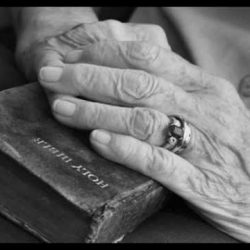
Repetabila povară / The repeatable burdenCine are părinţi, pe pământ nu în gând
Mai aude şi-n somn ochii lumii plângând
Că am fost, că n-am fost, ori că suntem cuminţi,
Astăzi îmbătrânind ne e dor de părinţi.Ce părinţi? Nişte oameni ce nu mai au loc
De atâţia copii şi de-atât nenoroc
Nişte cruci, încă vii, respirând tot mai greu,
Sunt părinţii aceştia ce oftează mereu.Ce părinţi? Nişte oameni, acolo şi ei,
Care ştiu dureros ce e suta de lei.
De sunt tineri sau nu, după actele lor,
Nu contează deloc, ei albiră de dor
Să le fie copilul c-o treaptă mai domn,
Câtă muncă în plus, şi ce chin, cât nesomn!Chiar acuma, când scriu, ca şi când aş urla,
Eu îi ştiu şi îi simt, pătimind undeva.
Ne-amintim, şi de ei, după lungi săptămâni
Fii bătrâni ce suntem, cu părinţii bătrâni
Dacă lemne şi-au luat, dacă oasele-i dor,
Dacă nu au murit trişti în casele lor…
Între ei şi copii e-o prăsilă de câini,
Şi e umbra de plumb a preazilnicei pâini.Cine are părinţi, pe pământ nu în gând,
Mai aude şi-n somn ochii lumii plângând.
Că din toate ce sunt, cel mai greu e să fii
Nu copil de părinţi, ci părinte de fii.Ochii lumii plângând, lacrimi multe s-au plâns
Însă pentru potop, încă nu-i de ajuns.
Mai avem noi părinţi? Mai au dânşii copii?
Pe pământul de cruci, numai om să nu fii,Umiliţi de nevoi şi cu capul plecat,
Într-un biet orăşel, într-o zare de sat,
Mai aşteaptă şi-acum, semne de la strămoşi
Sau scrisori de la fii cum c-ar fi norocoşi,
Şi ca nişte stafii, ies arare la porţi
Despre noi povestind, ca de moşii lor morţi.Cine are părinţi, încă nu e pierdut,
Cine are părinţi are încă trecut.
Ne-au făcut, ne-au crescut, ne-au adus până-aci,
Unde-avem şi noi însine ai noştri copii.
Enervanţi pot părea, când n-ai ce să-i mai rogi,
Şi în genere sunt şi niţel pisălogi.
Ba nu văd, ba n-aud, ba fac paşii prea mici,
Ba-i nevoie prea mult să le spui şi explici,
Cocoşaţi, cocârjaţi, într-un ritm infernal,
Te întreabă de ştii pe vre-un şef de spital.
Nu-i aşa că te-apucă o milă de tot,
Mai cu seamă de faptul că ei nu mai pot?
Că povară îi simţi şi ei ştiu că-i aşa
Şi se uită la tine ca şi când te-ar ruga…Mai avem, mai avem scurtă vreme de dus
Pe conştiinţă povara acestui apus
Şi pe urmă vom fi foarte liberi sub cer,
Se vor împutina cei ce n-au şi ne cer.
Iar când vom începe şi noi a simţi
Că povară suntem, pentru-ai noştri copii,
Şi abia într-un trist şi departe târziu,
Când vom şti disperaţi veşti, ce azi nu se ştiu,
Vom pricepe de ce fiii uită curând,
Şi nu văd nici un ochi de pe lume plângând,
Şi de ce încă nu e potop pe cuprins,
Deşi plouă mereu, deşi pururi a nins,
Deşi lumea în care părinţi am ajuns
De-o vecie-i mereu zguduită de plâns.Adrian PAUNESCU
………………
The repeatable burden
Whoever has parents, on this earth not in thought
He still hears in sleep the eyes of the world sob
If we were, if we weren’t, or if we are kind,
Today we get older with our parents in mind.What parents? Some people who no longer can fit
By so many children and so much mistreat
Some crosses, alive yet, breathing harder and shy,
Are these parents of ours who always sigh.What parents? Some people there too, with some dreams
Who painfully know what each penny means.
Whether young or not, as their papers provide,
Doesn’t matter at all, they’ve turned grey and abide.
To see their child land a step higher and deep,
How much work, and torment, and nights with no sleep!
Even now, when I’m writing, as if screaming I’d bear,
I know them, I feel them, suffering somewhere.
We remember of them, after long weeks on hold
Old sons what we are, with our parents old
Did they buy firewood, do they ache in their bone,
Didn’t they die sad in their house alone…
Between them and children is a progeny of dread,
And the shadow of lead of our daily bread.
Whoever has parents, on this earth not in thought
He still hears in sleep the eyes of the world sob
For the hardest to be is of all that exists
Not a child of parents, but a parent of kids.
From the eyes of the world many tears have been wept
But for heavenly flood not enough weeping yet.
Do we still have parents? Do they still children have?
On this earth of crosses to be man not to crave.
By their needs humbled and with their head bowed
In a poor little town, in a village remote,
Even now they are waiting from their elders a sign ,
Or letters from children telling that they are fine,
Like some ghosts they come rarely out to the gates,
Talking only of us like some dear dead fates.
Who has parents alive isn’t lost yet, at last
Who has parents alive he still has a past.
They made us, they raised us, they brought us so far,
Where we have our own children and parents we are.
They may seem annoying, when there’s no more to give,
They may get on our nerves, that is the narrative.
Either blind, either deaf, either slow on their lane,
Either it takes too long to tell them and explain,
Hunch-backed and stooping like carrying a cross,
They ask if you know of a hospital boss.
Don’t you feel a deep, strange pity at all
For they can’t do a thing by themselves anymore?
That you feel them as burden and they know that it’s true,
And they look at you as if they’d beg of you…
We still have a short time to bear and to shrine
On our conscience the burden of this sacred decline
After that under skies we shall be very freed,
There will be less of those who don’t have and who need.
And someday the time comes when feel it we shall
That a burden we are for our children as well,
And only at a sad and not a distant day ,
When we’ll know with despair news not known today,
We’ll get why the children so soon do forget,
And they see not an eye in the world cry regret,
Why throughout the earth there is still no flood,
Even though it’s been raining, even though it has snowed,
Even though the world where as parents we’re trying,
For an eternity has been shaken by crying.
TO MY FATHER, rest in peace…
trad. M. M. Biela
Terapeutică din anii ciumei / Therapeutics from the plague years
POSTED IN Mariana July 13, 2023

Terapeutică din anii ciumei / Therapeutics from the plague yearsDacă pleca uneori din oraș
era pentru că viața ei devenise
un fel de cameră părăsită în grabă,
pe care o regăsești mai târziu
jefuită de dihania amintirilor pitice.
În locurile în care i se întâmpla să ajungă,
pe la răscruci,
se rupea ca o pâine caldă
și își lepăda pielea de șarpe.
Înregimentate, răutățile strânse
în vremea din urmă
se scurgeau în praful drumului
iar ea își privea trupul nou cu uimire.
Se bucura de el ca în noaptea
în care, bâjbâind în întunericul anilor,
o steluță îi luminase
literele unei limbi
ce știa de acum să o recunoască.
Dacă pleca uneori
era pentru că lumile se prăbușeau
cu prea multă viteză
în somnul ei chinuit;
și astfel,
ceea ce dimineața părea a fi
idee cu articulații coerente și fine,
noaptea era găsit gunoi măturat cu obstinație
și ascuns după ușă.
– Aceasta este soarta oricărei utopii,
să dispară într-o zi în propriul gunoi,
să fie uitată și-ascunsă
aidoma unei boli rușinoase;
să moară în propriul ei orgoliu
cu articulații de ciută,
coerente și fine,
– veneau să o liniștească
bărbile înțelepților.
Dar ea atunci trântea ușile și mai în grabă,
lăsa orașul în urmă
și își ferea și mai mult fața
de orice chip omenesc.
Se așeza (bunăoară) pe la răscruci,
cu părul în flăcări,
zobită mărunt de neputința gâlgâitoare
care-i țâșnea din gâtlej,
de nebunia cu chip uman
în care i se cerea să fie ciută,
doar ciută,
cu articulații coerente și fine.
Mariana MARIN………………..
Therapeutics from the plague years
If she sometimes went out of town
it was because her life had become
a kind of hastily abandoned room,
which you find later
robbed by the beast of dwarven memories.
In the places where she happened to end up,
at the crossroads,
she would brake like warm bread
and shed her snakeskin.
Registered, the evils gathered
in recent times
were dripping into the road dust
and she looked at her new body in awe.
She rejoiced in it as in the night
when, groping in the darkness of years,
a little star had illuminated
the letters of a language
she now knew to recognize.
If she left sometimes
it was because worlds were collapsing
too fast
in her tormented sleep;
and thus,
what in the morning seemed to be
an idea with coherent and frail joints,
at night was found as trash obstinately swept up
and hidden behind the door.
– This is the fate of any utopia,
to disappear one day into its own trash,
to be forgotten and hidden
like a shameful disease;
to die in its own vanity
with joints of a doe,
coherent and frail,
– they came to soothe her
the beards of the wise.
But then she would slam the doors even more hastily,
leave the city behind
and hide her face even more
of any human form.
She would sit (for instance) at the crossroads,
her hair on fire
crushed to a pulp by the gurgling impotence
that gushed from her throat,
by the human-faced madness
in which she was required to be doe,
just doe
with coherent and frail joints.
trad. M. M. Biela
Kto jest poetą / Cine este poetul / Who is the poet
POSTED IN classic poetry July 13, 2023
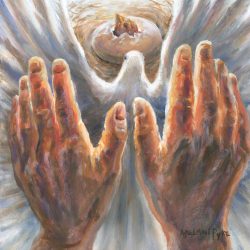
Kto jest poetą / Cine este poetul / Who is the poet
poetą jest ten który pisze wiersze
i ten który wierszy nie piszepoetą jest ten który zrzuca więzy
i ten który więzy sobie nakładapoetą jest ten który wierzy
i ten który uwierzyć nie możepoetą jest ten który kłamał
i ten którego okłamanopoetą jest ten co ma usta
i ten który połyka prawdęten który upadał
i ten który się podnosipoetą jest ten który odchodzi
i ten który odejść nie może
Tadeusz Różewicz
………………..Cine este poetul
poetul este cel care scrie poezii
si cel care nu scrie poeziipoetul este cel care rupe lanturile
şi cel care se inlantuiepoetul este cel care crede
și cel care nu poate credepoetul este cel care a mințit
iar cel care a fost minţitun poet este cel care are o gură
și cel care înghite adevărulcel care cade
si cel care se ridicăpoetul este cel care pleaca
și cel care nu poate pleca
………………..Who is the poet
a poet is he who writes poems
and he who doesn’t write poemsthe poet is he who breaks the bonds
and he who binds himselfthe poet is he who believes
and he who cannot believethe poet is he who has lied
and he who has been lied toa poet is he who has a mouth
and he who swallows the truththe one who fell
and the one who risesthe poet is he who leaves
and he who cannot leave
trad. M. M. Biela

Copyright © 2024 by Magdalena Biela. All rights reserved.